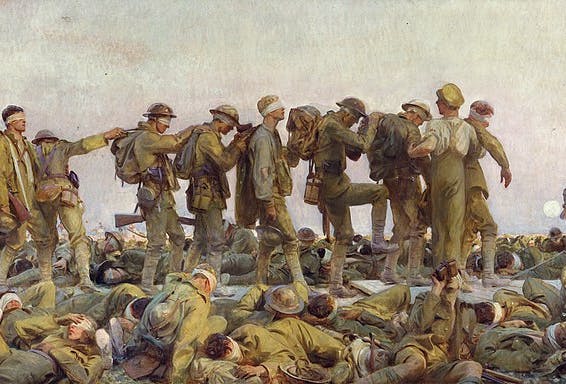Poem of the Day: ‘Disabled’
This week, as we meditate on that war which after all did not ‘end all wars,’ we might consider the additional pathos of this poem as an imagining of something worse than death in battle.

Thank you for your service. It’s what we say, isn’t it, to people in uniform, as we stand aside to let them board the airplane before us? Notably, it’s what we say to people who are alive, at least for the moment, like the rest of us. In that moment we don’t know whether they’re going out someplace dangerous, coming back from someplace dangerous, or simply facing the same minor statistical risks we all face when we trust our fate to the capable hands of some airline. But there they are, and we feel we should say something, and that’s the thing we say to strangers, because nothing else remotely apposite comes to mind.
In today’s Poem of the Day, outrages catalog themselves in the mind of a mutilated young man. Mostly his own youthful stupidity outrages him, the waste of his own life, which he now has nothing but leisure to contemplate. But it’s the visitor’s thanks in the penultimate stanza that appears in incredulous italics. Those italics resonate with unspoken meaning: thanks for what? For youthful vanity? For the idiocy of thinking that war would be simply a bigger football match? For the life thrown away, yet doomed to linger on in its own twilight? That service, that sacrifice: has it changed the world? Has it meant anything at all?
Wilfred Owen (1893–1918), whose “Futility” appeared as Poem of the Day on March 17, was one of the World War I poets who didn’t make it home. This week, as we continue to meditate on that war which after all did not “end all wars,” we might consider the additional pathos of this poem as an imagining of something worse than death in battle. Its loose pentameter stanzas begin with the overheard image of boys playing in the park, before “gathering sleep had mothered them from him.” By its end, the poem has earned the desperation with which the wounded man longs, himself, to be put to bed — to sleep, eventually: the merciful, mothering sleep of eternity. Every other hope is gone, and in that evening of despair, a visitor’s thanks ring with the cold black consolation which this poem’s vision might have offered its author in his trench.
Disabled
by Wilfred Owen
He sat in a wheeled chair, waiting for dark,
And shivered in his ghastly suit of grey,
Legless, sewn short at elbow. Through the park
Voices of boys rang saddening like a hymn,
Voices of play and pleasure after day,
Till gathering sleep had mothered them from him.
*
About this time Town used to swing so gay
When glow-lamps budded in the light-blue trees,
And girls glanced lovelier as the air grew dim,—
In the old times, before he threw away his knees.
Now he will never feel again how slim
Girls’ waists are, or how warm their subtle hands,
All of them touch him like some queer disease.
*
There was an artist silly for his face,
For it was younger than his youth, last year.
Now, he is old; his back will never brace;
He’s lost his colour very far from here,
Poured it down shell-holes till the veins ran dry,
And half his lifetime lapsed in the hot race
And leap of purple spurted from his thigh.
*
One time he liked a blood-smear down his leg,
After the matches carried shoulder-high.
It was after football, when he’d drunk a peg,
He thought he’d better join. He wonders why.
Someone had said he’d look a god in kilts.
That’s why; and maybe, too, to please his Meg,
Aye, that was it, to please the giddy jilts,
He asked to join. He didn’t have to beg;
Smiling they wrote his lie: aged nineteen years.
Germans he scarcely thought of, all their guilt,
And Austria’s, did not move him. And no fears
Of Fear came yet. He thought of jewelled hilts
For daggers in plaid socks; of smart salutes;
And care of arms; and leave; and pay arrears;
Esprit de corps; and hints for young recruits.
And soon, he was drafted out with drums and cheers.
*
Some cheered him home, but not as crowds cheer Goal.
Only a solemn man who brought him fruits
Thanked him; and then inquired about his soul.
*
Now, he will spend a few sick years in institutes,
And do what things the rules consider wise,
And take whatever pity they may dole.
Tonight he noticed how the women’s eyes
Passed from him to the strong men that were whole.
How cold and late it is! Why don’t they come
And put him into bed? Why don’t they come?
___________________________________________
With “Poem of the Day,” The New York Sun offers a daily portion of verse selected by Joseph Bottum with the help of the North Carolina poet Sally Thomas, the Sun’s associate poetry editor. Tied to the day, or the season, or just individual taste, the poems are drawn from the deep traditions of English verse: the great work of the past and the living poets who keep those traditions alive. The goal is always to show that poetry can still serve as a delight to the ear, an instruction to the mind, and a tonic for the soul.
